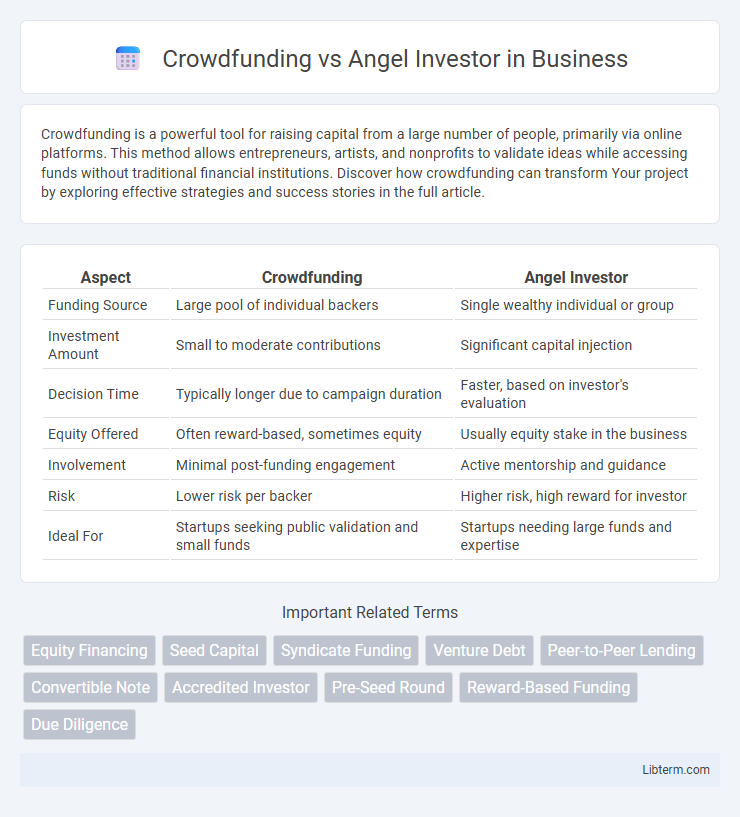Crowdfunding is a powerful tool for raising capital from a large number of people, primarily via online platforms. This method allows entrepreneurs, artists, and nonprofits to validate ideas while accessing funds without traditional financial institutions. Discover how crowdfunding can transform Your project by exploring effective strategies and success stories in the full article.
Table of Comparison
| Aspect | Crowdfunding | Angel Investor |
|---|---|---|
| Funding Source | Large pool of individual backers | Single wealthy individual or group |
| Investment Amount | Small to moderate contributions | Significant capital injection |
| Decision Time | Typically longer due to campaign duration | Faster, based on investor's evaluation |
| Equity Offered | Often reward-based, sometimes equity | Usually equity stake in the business |
| Involvement | Minimal post-funding engagement | Active mentorship and guidance |
| Risk | Lower risk per backer | Higher risk, high reward for investor |
| Ideal For | Startups seeking public validation and small funds | Startups needing large funds and expertise |
Introduction to Startup Funding Options
Startup funding options include crowdfunding and angel investors, each offering distinct advantages. Crowdfunding harnesses the power of the general public, allowing startups to raise capital through small contributions from many backers. Angel investors provide early-stage funding from affluent individuals who also offer strategic mentorship and industry connections.
What is Crowdfunding?
Crowdfunding is a financing method where entrepreneurs raise small amounts of capital from a large number of individuals, typically via online platforms like Kickstarter, Indiegogo, or GoFundMe. It allows startups and small businesses to gain access to funds without sacrificing equity or incurring debt, leveraging the power of community support and social networks. This approach contrasts with angel investors, who provide substantial funding and mentorship in exchange for ownership stakes or convertible debt.
What is an Angel Investor?
An angel investor is a high-net-worth individual who provides capital to startups or early-stage companies in exchange for equity or convertible debt. Unlike crowdfunding, angel investors often offer mentorship, industry connections, and strategic advice, playing an active role in the company's growth. These investors typically invest larger amounts than crowdfunding contributors and seek higher returns through business success.
Key Differences Between Crowdfunding and Angel Investors
Crowdfunding involves raising small amounts of capital from a large pool of individual investors typically through online platforms, allowing entrepreneurs to access diverse funding without giving up significant control. Angel investors provide substantial financial backing from affluent individuals who often contribute expertise and mentorship in exchange for equity and a more active role in business decisions. While crowdfunding offers rapid access to capital with minimal personal involvement, angel investors deliver personalized support and strategic guidance alongside funding.
Pros and Cons of Crowdfunding
Crowdfunding offers access to a large pool of potential investors, enabling businesses to raise funds without giving up significant equity or control, but it often requires substantial marketing effort and can attract smaller individual investments. This method provides validation and exposure through public campaigns, yet the process can be time-consuming and lacks the strategic guidance typically provided by angel investors. While crowdfunding mitigates reliance on a single backer, it may also present risks in managing diverse investor relations and potential intellectual property exposure.
Pros and Cons of Angel Investors
Angel investors provide early-stage startups with significant capital, industry expertise, and valuable networking opportunities, accelerating business growth. However, they often demand equity stakes and active involvement in company decisions, which may reduce founder control and lead to potential conflicts. Unlike crowdfunding, angel investments typically involve fewer backers but require thorough due diligence and alignment of long-term visions.
Factors to Consider When Choosing Funding
Choosing between crowdfunding and angel investors depends on factors such as funding amount, control, and timeline. Crowdfunding provides access to a large number of small investors, often ideal for market validation and marketing exposure but may require extensive promotion and time. Angel investors offer larger capital injections with mentorship potential but typically expect equity stakes and some influence on business decisions.
Suitability of Crowdfunding for Startups
Crowdfunding is highly suitable for startups seeking to validate their product ideas and gain early customer feedback while raising capital from a wide audience. It allows founders to maintain control without giving away equity, contrasting with angel investors who typically require ownership stakes and active involvement. Startups with innovative products or compelling stories benefit most from crowdfunding platforms like Kickstarter or Indiegogo, leveraging community support and marketing momentum.
Suitability of Angel Investors for Startups
Angel investors provide startups with not only capital but also valuable mentorship and industry connections, making them highly suitable for early-stage companies seeking strategic support. Unlike crowdfunding, which relies on a large pool of small contributors, angel investors typically offer substantial funding and personalized guidance tailored to the startup's growth trajectory. This individualized involvement often accelerates product development and market entry, crucial factors for startup success.
Making the Right Choice for Your Business
Choosing between crowdfunding and angel investors depends on your business goals, capital needs, and control preferences. Crowdfunding offers access to a broad audience, enabling market validation and community engagement without sacrificing equity, while angel investors provide substantial funding along with mentorship and strategic connections. Evaluate the trade-offs between immediate capital, long-term support, and ownership dilution to make the optimal decision for your business growth.
Crowdfunding Infographic

 libterm.com
libterm.com